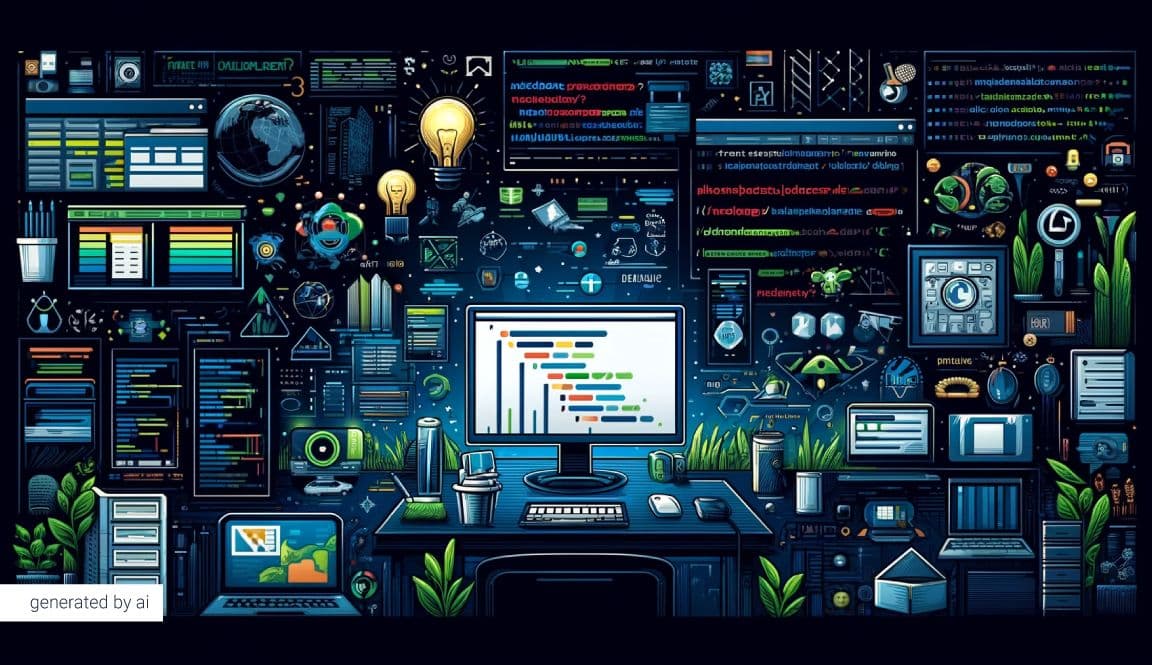
What is a Front End Developer? How to Become One?

Front-end developers use their knowledge and skills to design engaging and user-friendly websites. They implement programming languages like JavaScript, CSS, and HTML to allow users to smoothly access applications and websites. Essentially, when you visit a website, the design elements you see are created by a front-end developer. But do you know the technical and soft skills required to become a front-end developer, and which languages are currently used in this field?
What is a Front-End Developer?
A front-end developer is a professional responsible for working on the interface design and implementation as a front-end web developer. They work to create user interfaces. The user interface refers to the layout that determines what each part of a website or application does and how it appears.
All websites, online marketplaces where products are purchased, and blogs are developed with a user-friendly interface by front-end developers. To achieve this, the front-end developer undertakes the following responsibilities:
- Creating web pages with a good user experience
- Making optimal use of markup languages like HTML
- Maintaining and improving the website
- Optimizing for maximum speed
Front-end development is one of the areas of web development to consider when creating these sites and applications. As the name suggests, this area deals with the front end of the web application. This means that the entire area where the user clicks a button, scrolls a page, fills out a form, etc., is called the front end.
The other area of web development, the back end, refers to tasks running in the background, like infrastructure, database connections, and communication, which differ from the front end. Data storage security, site performance, and other server functions are included in back-end development. So, the front end is what is visible on the website, while the back end involves invisible tasks.
What Does a Front-End Developer Do?
A front-end developer is responsible for creating the user interface (UI) and user experience (UX) that users interact with to access the application. The front-end developer oversees all visible functionalities on the website. To create a good website and application that solves user problems, the front-end developer uses programming languages and tools along with their creativity and experience. To achieve this, front-end developers perform the following tasks:
- Use various programming languages for user experience.
- Leverage different markup languages to design web pages.
- Work on improving the website.
- Design mobile-based features and ensure the design is compatible with smartphones.
- Ensure web pages are optimized for best speed and scalability.
- Collaborate with web developers to increase usability.
- Collect feedback from users and customers and find solutions to problems.
- Work with back-end developers on coding and troubleshooting.
What is Required to Become a Front-End Developer?
To become a front-end developer, you need to learn certain technical knowledge and develop hardware and software skills. If you also want to become a front-end developer, the following steps can help you:
1. Knowledge of HTML, CSS, and JavaScript
HTML is the skeleton of all web pages and applications. To build a web page, you need to structure elements like paragraphs, sections, headers, and navigation bars, which is what HTML is used for. However, HTML alone is not enough; you need knowledge of CSS to make it presentable. CSS is used to improve the appearance of a web page. In other words, HTML is for formatting, and CSS is for styling. To be a good front-end developer, you need to learn these and, additionally, be proficient in JavaScript.
JavaScript is a programming language that makes web pages more interactive. You can use JavaScript to create animations, dynamic styling, and effects and behaviors when buttons are clicked.
2. Code Practice
To become a professional front-end developer, you need to practice coding consistently. These practices help you learn the concepts thoroughly. The more you practice, the better you'll understand the concepts, and you'll develop your command of programming languages more easily.
3. Knowledge of Command Line and Version Control
When practicing coding, you should also reinforce fundamental concepts like viewing web design-related files and navigating the file system. You can access operating system functions through a text interface and start learning the basics of coding. As a front-end developer, you should understand how the command line works, as it allows you to access operating system functions through a text-based interface. Many professionals prefer command-line interfaces (CLIs) for their speed and performance when installing libraries and frameworks.
Front-end developers should also be familiar with the most commonly used version control systems, such as Git. While coding, you'll often want to check coding history and other information. Version control systems make things easier, allowing you to efficiently track all changes made to the source code. This is especially useful when working with a team, as these systems help you keep track of which changes have been made.
4. Working with APIs
API, short for application programming interface, is a protocol that allows different applications to communicate and interact with each other. As a professional front-end developer, you should be familiar with APIs and how to use and modify them. APIs are also crucial for interaction with the back end and databases. There are many types of APIs, but the most common ones for front-end developers are:
- RESTful API: An API based on REST principles that uses standard HTTP methods to perform create, read, update, and delete operations.
- GraphQL API: A more flexible and efficient alternative to RESTful APIs, GraphQL allows clients to request only the data they need, reducing unnecessary data retrieval.
5. JavaScript Library
A JavaScript library is filled with pre-written scripts that make web development easier. By exploring and analyzing the most popular ones, you can benefit greatly from these scripts during the learning process. React, Angular, and Vue are popular scripts in JavaScript libraries that are also used by front-end developers.
6. Building an Online Portfolio
Creating your portfolio is the easiest way to showcase your expertise as a front-end developer. Since you're just starting with projects, not every portfolio piece needs to be a client project. You can take initiative, be creative, and use new tools and libraries to produce a good project.
While working on new projects, you might encounter errors. One of the biggest risks in coding is that changing a small thing can break the entire system. Even if you try to fix the problem, things might not always return to the way they were. In such cases, you can seek support from platforms like GitHub. These developer-focused platforms also help you stay updated. This way, you can easily keep track of innovations and updates.
7. Soft Skills
Front-end developers need to have strong written and verbal communication skills because this role involves interacting with both the technical team and clients. Therefore, you should improve your verbal and written communication skills. As a front-end developer, you should also be detail-oriented and meticulous.
Front-end developers are people who enjoy lifelong learning, researching, and keeping up with technological developments. As technology evolves, websites change; expectations regarding responsiveness, accessibility, and appearance are always shifting. For this reason, you must stay current and be prepared to learn new coding languages and libraries over time.
How to Become a Front-End Developer?
You become a front-end developer by increasing your technical knowledge and skills. Due to technological advancements and growing needs, a front-end developer should have the following skills:
- Knowledge of coding languages like jQuery in addition to HTML, CSS, and JavaScript.
- Understanding how server-side CSS works.
- Experience with graphic design applications like Adobe Illustrator for UX and UI.
- Ability to work with design tools like Adobe Photoshop and Sketch to convert visual designs into code.
- Knowledge of the basic principles of SEO to help improve customer success and enhance user experience.
- Understanding web performance optimization techniques for fast and efficient user experiences.
- Experience with cross-browser compatibility and knowledge of possible workarounds for issues.
- Developing a basic understanding of back-end technologies and how they integrate with front-end systems.
- Knowledge of web accessibility standards and best practices for creating comprehensive user experiences.
- Ability to solve problems and effectively debug and fix errors.
Learning the basics of coding languages and design tools typically doesn't take very long. With proper planning and effective work, it can be learned in just a few months. However, gaining expertise depends on experience and practice. You can participate in online events and courses to acquire technical knowledge and skills.
Techcareer.net, aiming to bring new talent to the IT sector, supports career journeys with bootcamp and hackathon events. Bootcamp training sessions are organized in many fields, from robotic coding to programming languages. During the training, you get the opportunity to learn theoretical information from expert instructors. You also get the chance to apply the theoretical knowledge in practice. After developing yourself, you can participate in hackathon events and win prizes in these competitions.
FAQ
How long does it take to become a front-end developer?
The time required to become a front-end developer depends on your past experience and coding knowledge. If you're just starting to learn programming languages, you'll need about three months of intense work. Afterward, to specialize in front-end development, you must participate in new projects where you can apply the languages you've learned and work on APIs and JavaScript libraries.
What are the requirements for bootcamp participation?
The requirements for bootcamp participation vary depending on each event. You can learn these requirements by checking out the events announced on the bootcamp page. However, these events generally include anyone aiming for a career in technology. If you're interested in software technologies and want to specialize in this field, you can participate in bootcamps.
Are bootcamp training sessions paid?
Bootcamp training sessions are completely free for those who want to specialize in the IT sector. During bootcamp events, which last about 6 to 8 weeks, you can work on projects and learn the most current information and technologies related to the field you want to specialize in.
What are the requirements for hackathon competitions?
The requirements for hackathon competitions also vary depending on the type of event. You can check out the events to see the participation details. However, almost all hackathon events require some level of knowledge and experience in specific areas. Therefore, you should prepare for hackathon competitions organized for the field you are interested in.
What features should I meet to apply for job postings?
Leading technology companies' job postings require varying levels of experience and expertise based on the job application. Therefore, you can conduct a detailed review of job postings to start your new career in your field of expertise and evaluate the positions that suit you.



